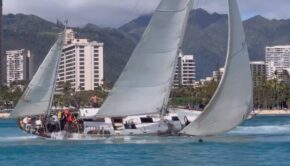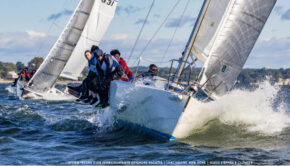75 Years of UK Sailmakers, part three
Published on March 16th, 2022
Founded in 1946 in City Island, New York by Charles “Buster” Ulmer as Charles Ulmer, Inc., UK Sailmakers is one of the world’s oldest groups of sail lofts. WindCheck magazine sat down with Charles “Butch” Ulmer to discuss his father’s founding of the company that bears his name, and its evolution. Following Part 1 and Part 2 of the interview, here is the third installment:
Butch, please tell us how you expanded Ulmer Sails beyond the two original lofts in City Island and Annapolis.
When Owen Torrey joined my loft in City Island, we instituted a couple of very significant changes to streamline our sailmaking and to enable us to replicate certain design and construction features in the sails. For instance, we used an early computer to help generate sizes, and we made large Mylar patterns for the edge curves on working sails and for the head and bottom panels of the radial head spinnakers. We started purchasing spinnaker cloth in untrimmed 750-yard rolls instead of the standard 100-yard rolls. Cumulatively, these changes improved our products and our bottom line and it became obvious that these “transferable” improvements might be attractive to other independent sailmakers.
My thinking was simple. Our company had a good name and reputation in the industry and that, along with these tangible improvements in manufacturing, might attract others to our banner. This in turn would make it easier to penetrate other markets and pay for a real advertising program. So we ran a small ad offering Ulmer Sails franchises in a national magazine and we started getting responses immediately. I had a customer who was also an experienced attorney and he quickly wrote up a franchise agreement and we were off and running.
In those days every loft made its own sails, so product consistency from loft to loft was a problem. Every sailmaker in the group was confident that his way of doing something was the best. At the same time, we had the benefit of each loft being independently owned so there was no lack of incentive or initiative.
On paper this all sounded great and it did work but not without a lot of “weeping and gnashing of teeth.” Our annual meetings, which featured a golf outing called the “Ulmer Open,” often became a free-for-all when group agreement was required for things like the ad budget. Nonetheless, the group grew, nationally and internationally, and we became a force in the industry and sport. – Full report









 We’ll keep your information safe.
We’ll keep your information safe.